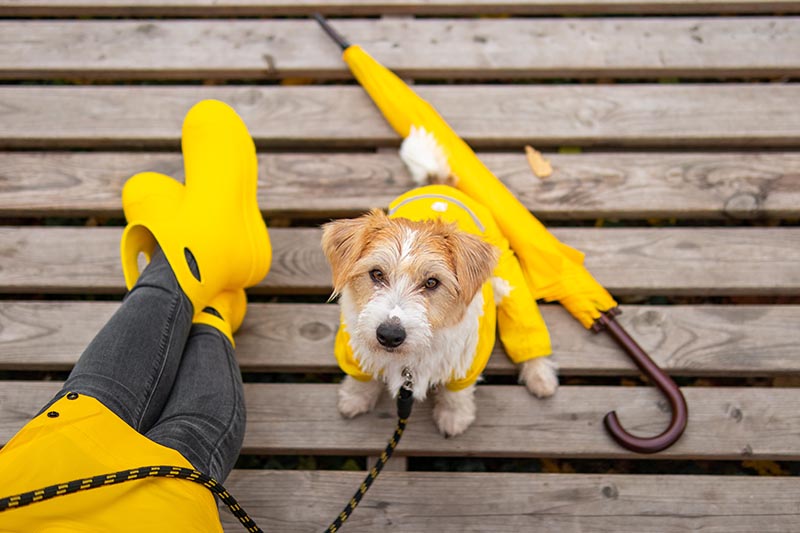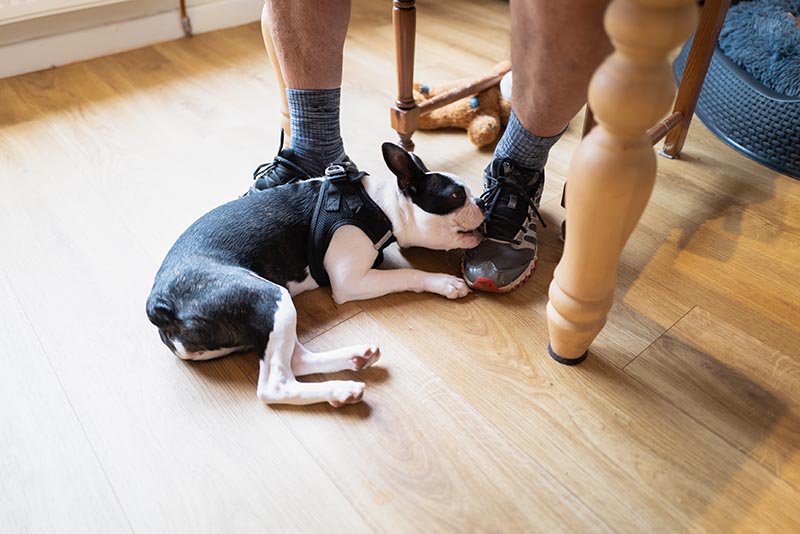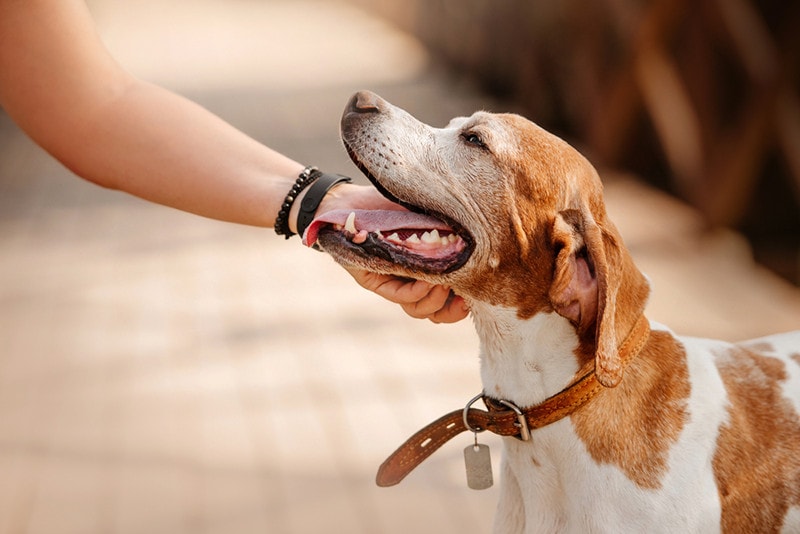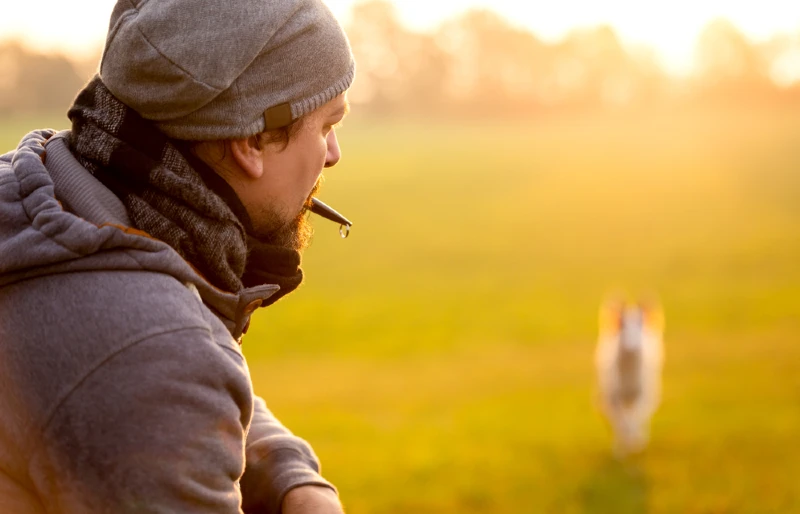
In English, we often use idioms and sayings to express ourselves in a more creative way. The same can be said of our canine companions! From barking up the wrong tree to raining cats and dogs, there are plenty of dog-related idioms that have been around for centuries. Here’s a look at 17 popular ones, what they mean, and where they come from.
The 17 Dog Idioms & Sayings
1. Barking Up the Wrong Tree
This idiom means to approach a problem from an incorrect angle or to make wrong assumptions about something. Its origin is believed to have been derived from fox hunting, when hounds would pursue the scent of an animal in the wrong direction and “bark” up the wrong tree.
2. Dog Tired
If you’re feeling exhausted — as if you could sleep for days — then you might be dog tired. It likely comes from dogs who work hard all day, like farm dogs and sled dogs, before finally collapsing into bed at night with nothing left but sleep.
3. Let Sleeping Dogs Lie
When someone tells you to let sleeping dogs lie, they’re asking you not to stir up an old disagreement or bring up a sensitive topic. It’s believed that the phrase comes from a time when it was common practice to let wild animals alone while they were sleeping in order to avoid getting attacked.

4. Top Dog
If you’re the top dog at your job, school, or organization, then you hold the most influential position in it. The phrase likely originated with dog fighting and cockfights where certain participants would always come out on top and be declared the victor — aka “top dog” — every time.
5. Raining Cats and Dogs
When it rains cats and dogs, it means there is a heavy downpour. This phrase dates back to the 16th century when people believed that cats and dogs rained down from the sky during storms because they couldn’t see what was actually happening in the clouds.
6. Three Dog Night
If you hear someone talking about a three dog night, they’re referring to a cold night where it gets so chilly outside that you need three dogs (or a big dog) to keep you warm while sleeping. This is an old Eskimo phrase and practice from centuries ago, when large furry dogs would sleep in bed with their owners for extra warmth.

7. Dog-Eat-Dog World
When the world is a dog-eat-dog place, it means that people are ruthless and will do whatever it takes to get ahead — even if it means stepping over others in the process. It comes from a time where wild dogs were known to be aggressive, hostile, and cannibalistic towards one another.
8. Sick Puppy
When someone calls another person a “sick puppy”, they are implying that the other person is demented or twisted in some way. This phrase is believed to have originated in the 1960s, when a character on the TV show “The Man from U.N.C.L.E” referred to his enemies as “sick puppies”.
9. Dog Days of Summer
The phrase “dog days of summer” refers to the hottest, most humid days of the year — usually occurring during late July and early August. It likely comes from ancient Greek and Roman times when they believed that Sirius (aka the “dog star”, the brightest star in the night sky) rose and set with the sun during this time period, making it extra hot and muggy outside.

10. My Dogs Are Barking
If someone says, “My dogs are barking”, they mean that their feet are sore and tired from walking. The phrase is thought to have come from the 19th century when shoes were made out of a thick material that would rub against the feet and make them sore — just like how a dog barks when it’s in pain.
11. Underdog
An underdog is someone who’s disadvantaged compared to their opponents — whether that be due to their skillset, resources, etc. The phrase most likely comes from dog fighting, where two animals would fight each other and the weaker one (with less experience or strength) was considered to be at a disadvantage. This phrase is still widely used today in sports and other competitive activities.
12. Dog In the Manger
If someone is acting like a dog in the manger, it means that they’re refusing to let others have something that they themselves don’t want — even though it won’t benefit them either way. The expression comes from an old fable about a farm animal called “the dog in the manger” who wouldn’t allow the other animals to eat hay from his feeding trough — even though he wasn’t eating it himself. This phrase is often used to refer to people who are selfish and stingy.

13. Lead a Dog’s Life
To lead a dog’s life means to be treated very badly or have an unpleasant existence — like a mistreated pet. This phrase likely comes from the Middle Ages when stray dogs would wander the streets looking for food and shelter and were constantly in danger of being attacked by wild animals or other humans. It has since been used as an expression for someone who is subject to hardship and misery.
14. Doggedly or Dogged Personality
This phrase means to persist and refuse to give up, even when faced with obstacles or difficulties. It likely originates from the idea of a hunting dog that would not stop tracking down its prey until it was able to capture it — showing its determination and persistence. Today, people use this word to describe those who continue on their path despite any hurdles they may face along the way.
15. The Hair of the Dog
If someone drinks “the hair of the dog”, they’re drinking a small amount of alcohol in the morning in order to cure a hangover. The phrase is derived from an old superstition which believed that applying a hair of the same animal or dog that bit you would help to cure the wound. Similarly, people today believe that consuming a small amount of alcohol will help to lessen the symptoms of a hangover. However, this is not scientifically proven and should be done with caution.

16. Dog Whistle Politics
This phrase is used to describe political strategies, rhetoric, or policies that are aimed at a specific group of people but remain largely undetectable to the general public. It originates from the idea of dog whistles — small, handheld devices that emit a high-pitched whistle only audible to dogs. Similarly, those practicing dog whistle politics use language and symbols that may not be immediately noticeable to the untrained ear but are nonetheless understood by a certain group. This type of communication has become increasingly prevalent in modern politics, often used as a way to gain support without alienating other potential voters.
17. Go to the Dogs
This phrase is used in a negative sense to describe something that has fallen apart or deteriorated. It likely originates from the idea of stray dogs living on the streets, which was seen as a sign of poverty and ruin during the Middle Ages. Today, it’s used to describe situations where things have gone wrong or when standards have dropped significantly. For example, “This school has gone to the dogs since the new principal took over.” In this context, it means that things have gotten much worse under the new principal’s leadership.

Conclusion
It’s amazing to think about how many of our common sayings and colloquialisms are actually rooted in the behavior of our canine friends! From their loyalty to their determination, dogs have been an inspiration for language throughout history — and continue to be so today. Whether we’re talking about leading a “dog’s life” or praising someone for being the “top dog”, we owe a lot of our expressions to our four-legged friends. So next time you find yourself using one of these phrases in everyday conversation, remember that you have man’s best friend to thank for it!
Featured Image Credit: Tanya Consaul Photography, Shutterstock







